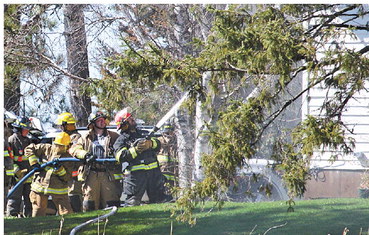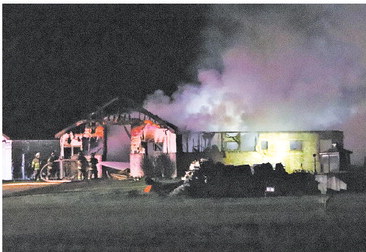Marathonadopts $2.1 million budget


By Kevin O’Brien
Marathon City trustees adopted a 2024 budget last week that includes $2.1 million in revenues and expenditures, raises local taxes by 1.7 percent and incorporates a significant increase in fire protection fees from neighboring townships.
At a Nov. 1 public hearing on the budget, interim administrator Andy Kurtz told the village board that next year’s village budget allows for nearly $42,000 to be deposited into the general fund reserve, leaving a projected fund balance of about $901,000 at the end of 2024.
“As it sits, we’re in pretty good shape budget-wise,” he said. “We have good growth in the community. Our equalized value increased, the assessed value increased.”
The village will collect a total of $931,385 in property taxes next year, an increase of $15,754 over this year. Because the village’s tax base grew by 1.8 percent due to net new construction, it could have raised taxes by that same percentage, but it chose a 1.7 percent hike instead. A mill rate of $7.41 per thousand dollars of property value – or $741 on a $100,000 house – will be used to generate the levy.
Marathon will see its state aid increase by $56,286 in 2024 after lawmakers approved a new revenue- sharing formula earlier this year. Transportation aid will also go up slightly, which is the result of the village spending more on local street projects in recent years and boosting the five-year average of expenses used to calculate the aid. “As we continue to invest in streets, we will get more revenue from the state to help with that,” Kurtz said.
One significant change in next year’s budget is the amount of money the village will be charging the towns of Stettin, Cassel and Rib Falls for fire protection. Under new five-year contracts presented to town officials, the annual fee each town pays will help cover the actual cost of running the fire department based on the town’s share of equalized property value, he said.
“Historically – I would say this has probably been going on for the better part of two, maybe three decades – the village has been subsidizing fire services
See MARATHON CITY BUDGET/ page 3 Marathon City budget
Continued from page 1
across the board for the townships,” he said.
Kurtz said the new fire contracts include a “pretty big increase for the towns,” but he noted that the towns also saw an increase in state aid due to the new law, and that extra money should be more than enough to cover the increased fire protection fees.
All together, fire contract fees will increase by about $61,800 next year, but the village itself will also take on more costs in order to pay down debt on fire department equipment, Kurtz said.
Trustee Keith Paul, who has taken a lead role in presenting the new fire contracts to the three surrounding townships, said he was recently told that Stettin’s board had approved its contract. Kurtz also mentioned that Cassel is moving forward with ratifying its contract.
Paul said he’s had several phone conversations with Rib Falls, and even though no commitment has been made yet, he said the conversations have been “productive.” He said town chairman Tim Wunsch told him that the town board would not be able to discuss the contract until its December meeting because of other pressing business this month.
If the township does not agree to the village’s terms by the end of the year, Kurtz said village officials will have to address the issue “at that point,” preferably before the start of 2024.
“The anticipation is that the agreements will be signed and we will be able to answer the questions to their satisfaction as we have done with the other two towns,” he said.
Trustee Mark Ahrens applauded Paul for putting in extra time to talk with the townships, and said village officials are willing to meet in-person with Rib Falls representatives to answer any of their questions.
“It’s all out in the open,” he said. Looking ahead, Kurtz said a villagewide revaluation is scheduled for 2025, which will update the assessed values of all Marathon’s homes and businesses so the amounts are more in line with equalized values. The last revaluation was done in 2009, he noted.
“We have fallen further and further behind in the assessments compared to the fair market value estimates that the Department of Revenue does,” he said.
As part of the process, residents will have a chance to talk with the assessor and challenge their assessment before the village’s board of review. Kurtz noted that an increase in a property’s assessed value does not necessarily mean that the owner’s tax bill will go up, though it will change how the tax levy is distributed among residents.
“If your valuation goes up 10 percent, as an example, that doesn’t mean your taxes are going up 10 percent,” he said. “So, before everybody panics, just keep that in mind that it’s a process we have to go through, and it’s not a straight-line correlation between your assessment and your taxes.”
In other business:
n Trustees directed new village administrator Steven Cherek to reach out to other municipalities and see if they pay elected officials extra for attending non-village meetings. The issue came up in light of trustees attending town board meetings to discuss the fire contracts. Board members were unsure if it was worth going through the process of changing their compensation, which would involve consulting the village attorney and developing a new policy, so they wanted more information before moving ahead.
n The board approved the village’s 2024 labor agreement, which was negotiated with General Teamsters Union Local 662 and establishes hourly wages for all of the village’s non-managerial staff, excluding police officers. Trustees also approved 2024 wages and salaries for all village employees, which includes $2,500 annually for village president Kurt Handrick and $50 per meeting for trustees. Other notable salaries include $78,000 for Cherek, $71,400 for police chief Tyler Geske and $40 per hour for DPW Ken Bloom.
n During his monthly report, Kurtz said street projects have been completed on Third Street and CTH B, and construction continues on North Ridge Road. Work has also started on the business park expansion north of STH 29, with water and sewer lines to be bored underneath the highway, off Blue Stone Lane, this week and next.
n Kurtz said he will be in Marathon on Nov. 9 and 10 to share information with Cherek on the administrator’s duties and introduce him to business leaders in the village.
Steven Cherek




